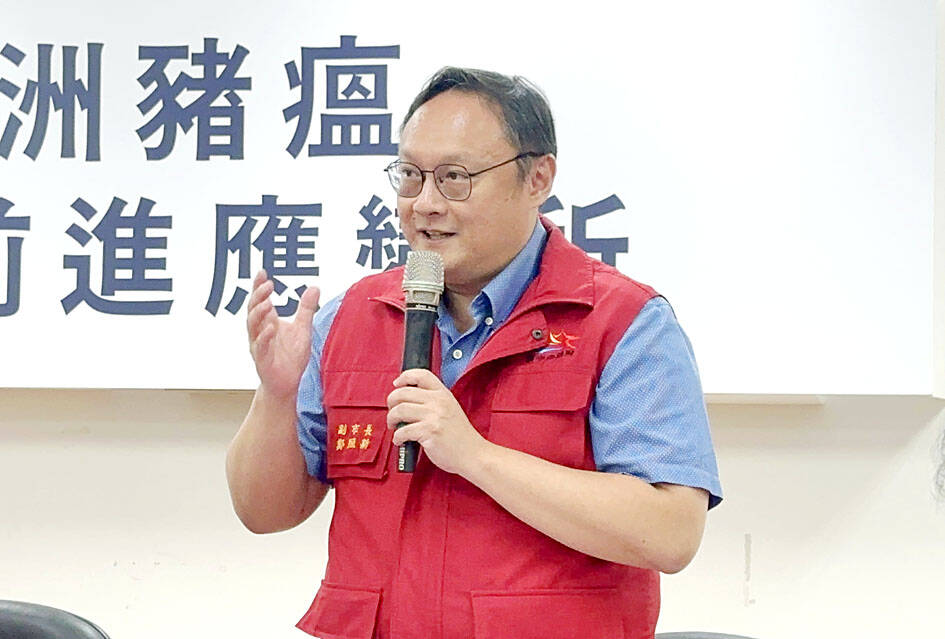The gene sequencing results of Taiwan’s first cases of African swine fever (ASF), which could help determine the virus’ source, would be released tomorrow at the earliest, the Ministry of Agriculture said yesterday.
The cases were publicly confirmed on Wednesday last week following an outbreak at a pig farm in Taichung’s Wuci District (梧棲).
Minister of Agriculture Chen Junne-jih (陳駿季) told the legislature that the sequencing would be matched with results uploaded by other countries to determine similarity and infer the origin.

Photo: CNA
However, China has not uploaded its gene sequencing data, he added.
Out of the 9,511 samples from illegally imported pork products, brought in or discarded at the border, from 2018 to Thursday last week, 997 tested positive for the ASF virus, the ministry said.
Of them, 147 were from China, 13 from Vietnam and Thailand.
Taiwan has never had ASF, so the first case must have been imported, Chen said, adding that preventing its spread through investigations and sterilizing food waste is a priority to eradicate it, he said.
Subsidies for the pork industry would be announced by Saturday, after related budgets are reported to the Executive Yuan, he said.
Subsidies for culled pigs would likely be conditional, and while it could not implement a price guarantee, the government would stabilize the quantity of pork in the wholesale market after a transportation and slaughter ban is lifted, with a monitored price and further adjustments on the way, he said.
Officials are still debating whether eateries serving pork dishes should receive subsidies, which would be difficult to determine, he added.
Meanwhile, Taichung Deputy Mayor Cheng Chao-hsin (鄭照新) told a news conference in the city that triplicate forms documenting the disposal of dead pigs were tampered with, leading to discrepancies in reported figures.
The evidence was sent to prosecutors for investigation on Sunday and Tuesday, Cheng said.
The forms are important for ASF mortality statistics and case investigations, with one copy kept by the rendering plant, one by local animal health authorities and one by the hog farmer, officials said.
Regarding the economic impact of the outbreak, Taichung Mayor Lu Shiow-yen (盧秀燕) said that 400 fresh meat vendors in the city were affected by supply shortages, with some forced to close.
Public markets would temporarily waive rental fees, and central and local governments are working to provide additional compensation, she said.
Meanwhile, a veterinarian aide surnamed Wang (王), who was consulted by the farm where the outbreak was detected, was questioned by prosecutors yesterday to determine whether he had illegally prescribed medication for pigs, which only licensed veterinarians are authorized to do, the Taichung City Government said.
The hog farm owner told investigators that he had consulted Wang, who had reported the abnormal deaths of pigs at the farm, when he found pigs dying before administering drugs to the animals, the government said.
Wang — who left the country after the incident, but returned on Tuesday — could face a fine of NT$100,000 to NT$500,000, it said.
He was summoned yesterday morning to ascertain if the Act on the Prevention and Control of Infectious Animal Disease (動物傳染病防治條例) had been contravened, prosecutors said.
He was released after being questioned as a witness and consented to have his mobile phone examined for evidence, they added.
Additional reporting by Tsai Shu-yuan

A small number of Taiwanese this year lost their citizenship rights after traveling in China and obtaining a one-time Chinese passport to cross the border into Russia, a source said today. The people signed up through Chinese travel agencies for tours of neighboring Russia with companies claiming they could obtain Russian visas and fast-track border clearance, the source said on condition of anonymity. The travelers were actually issued one-time-use Chinese passports, they said. Taiwanese are prohibited from holding a Chinese passport or household registration. If found to have a Chinese ID, they may lose their resident status under Article 9-1

Taiwanese were praised for their composure after a video filmed by Taiwanese tourists capturing the moment a magnitude 7.5 earthquake struck Japan’s Aomori Prefecture went viral on social media. The video shows a hotel room shaking violently amid Monday’s quake, with objects falling to the ground. Two Taiwanese began filming with their mobile phones, while two others held the sides of a TV to prevent it from falling. When the shaking stopped, the pair calmly took down the TV and laid it flat on a tatami mat, the video shows. The video also captured the group talking about the safety of their companions bathing

PROBLEMATIC APP: Citing more than 1,000 fraud cases, the government is taking the app down for a year, but opposition voices are calling it censorship Chinese Nationalist Party (KMT) Chairwoman Cheng Li-wun (鄭麗文) yesterday decried a government plan to suspend access to Chinese social media platform Xiaohongshu (小紅書) for one year as censorship, while the Presidential Office backed the plan. The Ministry of the Interior on Thursday cited security risks and accusations that the Instagram-like app, known as Rednote in English, had figured in more than 1,700 fraud cases since last year. The company, which has about 3 million users in Taiwan, has not yet responded to requests for comment. “Many people online are already asking ‘How to climb over the firewall to access Xiaohongshu,’” Cheng posted on

A classified Pentagon-produced, multiyear assessment — the Overmatch brief — highlighted unreported Chinese capabilities to destroy US military assets and identified US supply chain choke points, painting a disturbing picture of waning US military might, a New York Times editorial published on Monday said. US Secretary of Defense Pete Hegseth’s comments in November last year that “we lose every time” in Pentagon-conducted war games pitting the US against China further highlighted the uncertainty about the US’ capability to intervene in the event of a Chinese invasion of Taiwan. “It shows the Pentagon’s overreliance on expensive, vulnerable weapons as adversaries field cheap, technologically